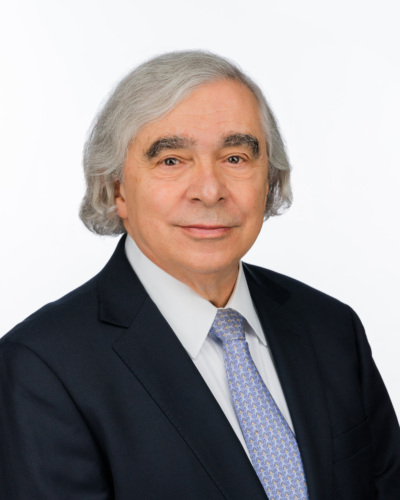
Ernest J. Moniz
Co-Chair and Chief Executive Officer, NTI
MS. SHERY AHN: What would a sequencing for denuclearization look like that could potentially satisfy not only the United States, but also North Korea?
SEC. MONIZ: Well, first of all I think there is an encouraging realization that this will be a step-by-step process that has to be followed. And the first step of course was North Korea's voluntary suspension of tests. I think going forward, as negotiations move forward, that has to be formalized because the testing, both nuclear weapons and long-range missiles, that suspension is very, very important.
I think secondly, before one gets to the issue of removing or dismantling nuclear weapons in North Korea, there will have to be a stoppage of producing more and more weapons material. Our intelligence services have said that every indication is they continue to produce the plutonium, the enriched uranium needed for weapons. So while they may not have the full capability for long-range missiles to strike the United States yet, the fact is there are other ways of delivering nuclear weapons. So addressing the materials for nuclear weapons I think is second. Once you get to that step, you inherently start to get into verification and transparency. This will be a very, very tough issue to address.
And then you will go to the final step of nuclear weapons dismantlement. I think what this says is, once again, it's step-by-step. And what we really hope comes out of this summit is the empowerment of the envoys on both sides to get together, get full negotiating teams and start hacking away, frankly, at the tough problems just as we did in the Iran deal.
AHN: Right. So Secretary Moniz, let's start with your first point, which is the fact that President Trump is touting the halting of these tests as success in itself. How advanced are North Korea's nuclear capabilities? Do these tests even matter anymore at where they are right now on their nuclear skills?
MONIZ: Well, it's very clear. They've shown the ability to set off very, very large nuclear explosives. They've also shown the capability of having a ballistic missile with the power to reach the United States. But that's a very, very long way from marrying together, understanding the forces that would — that missile would be exposed to in an actual launch. So I think the testing moratorium is very important. I agree with the President on that. However, as I say, for a real agreement going forward on denuclearization, that has to become a permanent, permanent suspension of tests.
AHN: And given the size of North Korea's nuclear program, which really is so much larger than any other nuclear programs around the world, including Iran, what are the challenges in not only disabling but dismantling eventually such facilities as Yongbyon nuclear facility?
MONIZ: Well, first of all, I do want to clarify that Iran does not have nuclear weapons. That's a very important distinction. With North Korea, you're absolutely right. They've built up a large nuclear complex, many nuclear weapons, and we believe that if anyone is thinking that somehow these nuclear weapons magically get moved out of North Korea for dismantlement, that won't happen. So we need to put in place a program as we did with the Soviet Union after the collapse of that political entity. We put together a program in which America and many other countries gave technical expertise, gave resources and worked with, in that case, the Soviet, the former Soviet scientists, in this case with the North Korean scientists on dismantling their program. Frankly in the end we believe it's going to be the North Koreans who do the dismantling of their own nuclear weapons with sufficient transparency and verification to satisfy the international community.
AHN: Just quickly, you mentioned verification of course. When do you get the international organizations like the IAEA involved?
MONIZ: Well, as far as I'm concerned, as soon as possible. Now obviously the question of verifying that they're not testing is something we can do outside. But as soon as we started going into their nuclear materials production facilities, Yongbyon and perhaps beyond Yongbyon, because we all have the suspicion they have additional uranium enrichment plants, it's very, very difficult to do that without on-the-ground inspectors.
But those inspectors need to have the freedom to go to places that are viewed for good reason to be suspicious. That was not part of previous agreements. So these are the kinds of advances that are going to be very, very hard, especially given how closed a society you have in North Korea. But without verification and transparency, it won't work. I think it should be made clear, I can't imagine an agreement being reached on the basis of trust. It has to be reached on the basis of a lot of blocking and tackling and getting very, very specific verification measures in place.
AHN: Secretary Moniz, just finally, escalating tensions between nuclear-armed India and Pakistan. What are the risks involved here?
MR. MONIZ: The risks are enormous. We believe that in fact the risk of a nuclear weapon being used today is higher than any time since the Cuban Missile Crisis. And right now India and Pakistan are demonstrating that, as a regional conflict that could escalate. Probably if it does, and obviously we hope it does not, but if it does escalate probably through miscalculation rather than intent, and that is a major, major risk. And the consequences would be disastrous of course for India and Pakistan. But those consequences would spread to many, many other parts of that continent.
Sign up for our newsletter to get the latest on nuclear and biological threats.
There is a critical need for a global diplomatic approach to address growing cyber risks, including, where possible, through cooperation between the United States and Russia.
“The bottom line is that the countries and areas with the greatest responsibility for protecting the world from a catastrophic act of nuclear terrorism are derelict in their duty,” the 2023 NTI Index reports.
Christopher Nolan's Oppenheimer is the most high-profile film about nuclear weapons ever made.


